Double Bachelor's Degree in Primary Education + Humanities and Cultural Studies
*Subject to review each year
Gain the best skills to do your job well
Complement your academic experience with the professional world
Discover why you should study these two degrees simultaneously with us
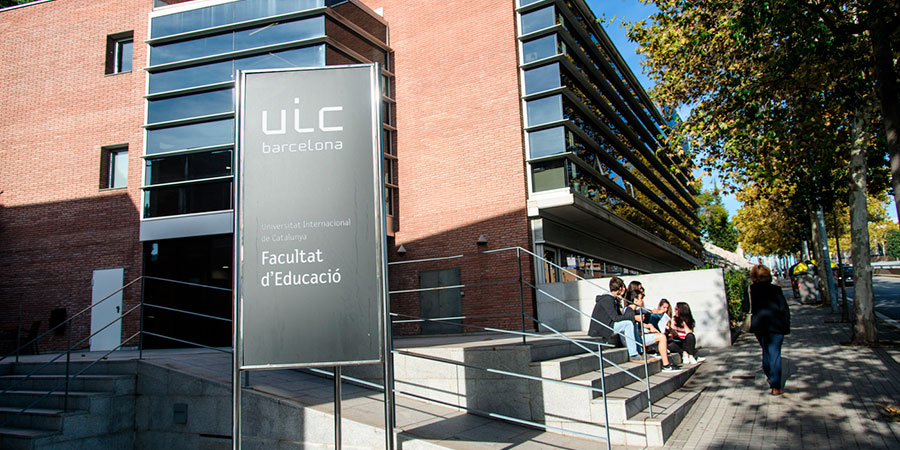
A pioneering double degree in Catalonia
Broaden your horizons and increase the chances of success on the job market. In four years, you will receive the Degree in Primary Education. With one more year, you will complete the second Degree in Humanities and Cultural Studies.
Upon graduating from this double degree, not only will you be able to teach primary school students, but you will also be able to work as teacher for secondary and upper secondary school and advanced vocational training courses in the field of arts and humanities. In order to reach this objective, once you have completed the double degree, you will need to take the Master’s degree required by the Ministry of Education to teach at secondary school level. At UIC Barcelona, we support you every step of the way, offering you the chance to take this Master's degree and specialise in Spanish and Catalan language and literature or in English language.
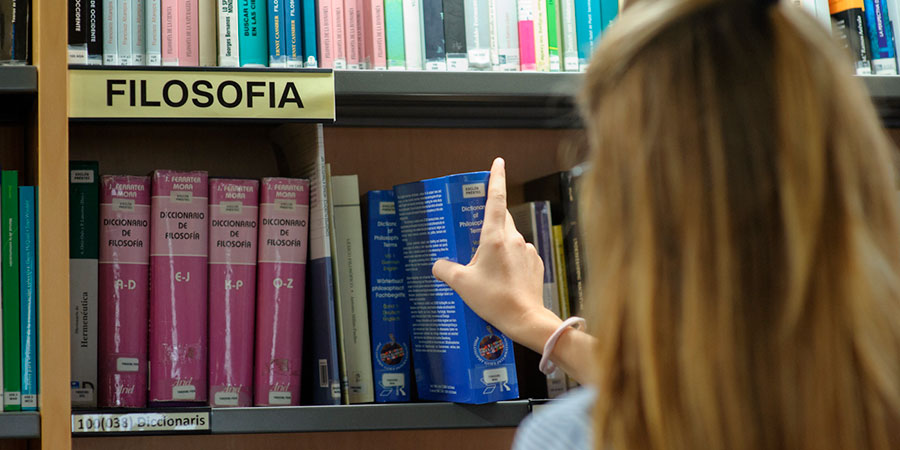
Multidisciplinary profile
Teach primary and secondary education humanities and social science classes. Also, common subjects for all upper secondary education.

Further study in STEM education
We also strongly advocate STEM education (Science, Technology, Engineering and Mathematics) in schools and promote t through our robotics workshops, the Experimental Science laboratories and the Domo greenhouse (university allotments).
Discover the career opportunities for these studies
The combination of both degrees opens the doors to broader job markets, especially concerning your specialisation as a teacher. With this double degree you can teach:
- Primary and Secondary education
- Upper secondary education Humanities and Social Science subjects
- Common subjects for all upper secondary education
Students tell you their experience
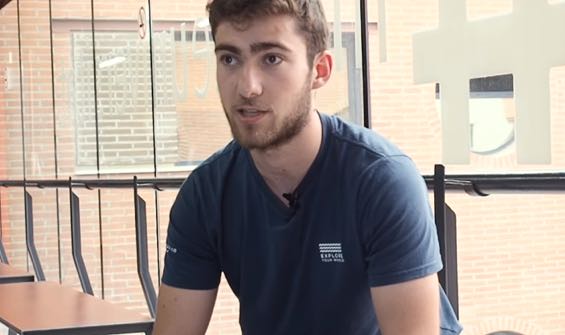
“I chose Humanities because I like studying, many degrees should have this humanities foundation.”
Marc Crosas
Primary Education + Humanities Degree student
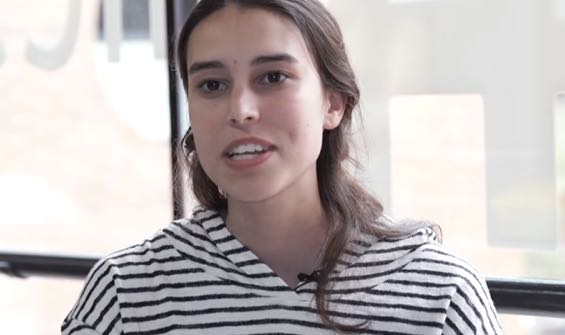
“At the Faculty we have created the Paideia student association to broaden our knowledge and we organise conferences, sessions beyond University, visits, etc.”
Patricia Messa
Humanities Degree student
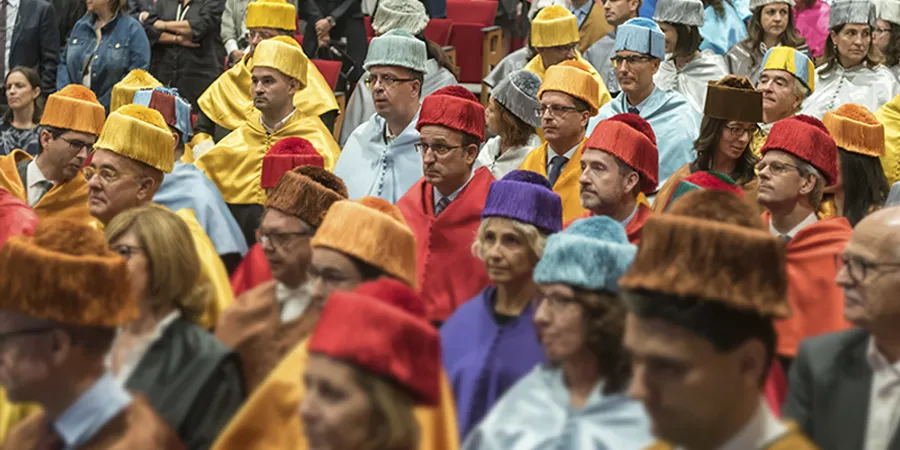
Professors and lecturers who make good teachers
The teaching team in the Faculty of Education consists of professionals who train future teachers using the most innovative methodologies. They are also involved in important research activities both inside and outside the university. Direct contact with professional practice allows our professors and lecturers to transmit a comprehensive, multidisciplinary and human overview of the reality in the sector to students.
Summer courses at Berkeley

Study a degree that will allow you to acquire an international profile and study at one of the most renowned universities in the United States to step up your education and progress in your knowledge of other languages. You can also get part of your ECTS during the summer at the Berkeley Summer Sessions, the best public university in the world.
Presentation
UIC Barcelona offers you the opportunity to take our Double Bachelor's Degree in Primary Education and Humanities and Cultural Studies and take advantage of the plan to validate subjects common to both degree courses.
It is a unique opportunity to expand your job prospects, especially with regards to your specialisation as a teacher. With this double degree course you will be able to teach:
- In primary and secondary schools
- Social science and humanities subjects in upper secondary education
- Subjects taught in all types of baccalaureate/upper secondary education courses (Philosophy and Citizenship, Catalan Language and Literature, Spanish Language and Literature).
Further your education with a view to pursuing a career in the teaching world or in diverse sectors such as culture (museums, art galleries, publishing, heritage and cultural tourism, community centres, cultural centres, town governments, foundations), organisations (NGOs, development projects, integration and mediation, international cooperation), communication and business and research, among others.
Objectives
We teach you based on objectives. The Bachelor's Degree will provide:
- A sound command of all applicable course content. Always from a global perspective.
- Techniques to ensure peaceful co-existence in the classroom through emotional education and autonomy. Promotion of effort, constancy and discipline.
- Knowledge of how language develops in a multicultural and multilingual environment.
- Out-of-classroom skills relating to school organisation, tutoring sessions for parents or your relationship with other education agents. Preparation for the demands of today's society.
- Sensitivity to diversity and gender equality. Respect for human rights and civic values.
- The ability to introduce students to the digital world and add cultural richness through new pedagogical possibilities.
- Valuing cooperative work, a critical spirit and responsibility in relation to a sustainable future.
Competences of graduates
Your competences are what set you apart as a teacher who is useful to society.
Cross-disciplinary competences
Mastery of information technology and communication, languages (Catalan, Spanish, English), developed critical thinking and reflective analysis, the ability to be creative.
Teacher-specific competences
Expertise in the subjects you teach and the teaching methods you employ, ability to work with colleagues and other staff members, professional development.
Subject-specific competences
Competences you will develop through a number of diverse methods such as lectures, case studies, problem solving and problem-based, project-oriented, cooperative and independent learning.
At UIC Barcelona we will assess your competences through: objective exams, assignments and projects, portfolios, reports, self-evaluation, interviews, etc.
Academic accreditation
Double Bachelor's Degree in Primary Education, Humanities and Cultural Studies.
Teachers
- AGUIRRE ARTEAGA, Georgina
- AGUSTIN BRETOS, Susana
- ALBAREDA TIANA, Sílvia
- AMORES BARGAY, Joan
- BALAGUER FÀBREGAS, Maria Carmen
- BALCELLS SANAHUJA, Meritxell
- BONET PEROT, Ariadna
- BOSCH RABELL, Magdalena
- CABALLERO RIVAS, Cristina
- CAMPAMÀ TUBAU, Joan
- CAMPS BANSELL, Jaime
- CARBALLO MARQUEZ, Anna
- CARR MILIO, Tomas Joaquin
- CIBORRO ROJO, Núria
- CREUS JORQUERA, Ingrid
- DE BOFARULL DE TORRENTS, Ignacio
- DÍAZ HEVIA, Pablo
- DOMINGO COSCOLLOLA, Maria
- DOMÍNGUEZ BERNÚS, Alejandro
- ESTRADA BASCUÑANA, Carolina
- FERNÁNDEZ ELORDUY, Ainhoa
- FUERTES CAMACHO, Maria Teresa
- GONZÁLEZ MANCEBO, Sheila
- GRAELL MARTIN, Mariona
- GRAU GRAU, Marc
- GUTIÉRREZ SIERRA, Andreu
- HOWES, Christina Angela
- INSENSER MORENO, Maria
- JIMÉNEZ LÓPEZ, Esther
- LUNA BROSA, Maria Cristina
- MARTÍN GASCON, Beatriz
- MARTORELL SABATÉ, Eduard
- MASVIDAL ROQUET-JALMAR, Nuria Maria
- MEHRAD, Aida
- MONFORTE, Pierre Jérome
- NAVARRO GIL, Noelia
- OLIVA MARTÍNEZ, Francisco-Javier
- PASCUAL SÁNCHEZ, Joel
- PERETA SIMÓN, Elena
- PONS MUDARRA, Cristina
- PORTELL RIFÀ, Joan
- PUIG VOLTAS, Jordi
- PUJOL VALLS, Maria
- RODRÍGUEZ PRAT, Andrea Mercedes
- ROIG MARZÁ, Alberto
- ROMERO VELASCO, Margarita
- ROQUET PUGÈS, Helena
- SÁNCHEZ CAMACHO, Rafael
- SCOTT, Yolanda Isabel
- SEGURA MOLLÀ, Marta
- SEGURA RODRÍGUEZ, Cristina
- SERRA ORDOÑEZ, Montserrat
- TUSET MATEU, Mª Teresa
- VASYLETS, Olena
- VERDERA ALBIÑANA, Asunción
- VIDAL FLURIACH, Carla
- VIDAL RODÀ, Enric
- AFFLECK, Katrina
- ALSINA CASANOVA, Mª Guadalupe
- ALSINA CASANOVA, Miguel
- BARÓ QUERALT, Xavier
- BASTONS PRAT, Miquel
- BERMEJO GREGORIO, Jordi
- BERNAUS VIDAL, Magdalena
- BONO VELILLA, Rosa
- BOSCH RABELL, Magdalena
- CASASAMPERA FERNÁNDEZ, Jordi
- CAVALLOTTI, Rita
- CORCÓ JUVIÑÁ, Josep
- CRISPÍ CANTON, Marta
- CURIEL LÓPEZ-CEPERO, Martín Andrés
- DE IRALA ESTÉVEZ, Jokin
- ELRAZZAZ ELRAZZAZ, Mohammed Hassan
- ESCRIBANO LÓPEZ, Francesc Xavier
- ESTÉVEZ ESCALERA, Alberto
- FERNÁNDEZ BORSOT, Gabriel
- FUENTES MILA, Sergio
- GALI PEREZ, Hortensia
- GARÍ DE BARBARÀ, Xavier
- HERNANDEZ SERRET, Joan
- JIMÉNEZ YÁÑEZ, Ricardo María
- LASTRA MARTÍNEZ, Andrea
- MARIMON VIADIU, Frederic
- MARTORELL ESTRENJER, Maria
- MAS MACHUCA, Marta
- MASSANA MAS, Sergi
- MIRÓ COMAS, Abel
- MOYA RUIZ, Albert
- NEBRERA GONZÁLEZ, Montserrat
- NUBIOLA AGUILAR, Jaime
- ORTELLS NICOLAU, Xavier
- PALACÍN MEJÍAS, Marta
- PONS PUJOL, Luis
- POU VAN DEN BOSSCHE, Anna
- REDONDO LÓPEZ, Nieves
- REGUANT MONTIEL, Blanca
- RENAU ALEJANDRO, Vera
- ROBLES FITÓ, Alexandre
- STANGER DEACON, Doris
- TANGANELLI BERNADES, David
- TORRES MORALES, Bernat
- TRULLOLS GIL-DELGADO, Luis Fernando
- URBANO LORENTE, Judith
- VALLÈS BOTEY, Teresa
- ZÁRATE RIVERO, Belén
Prerequisites & admissions
PAP Test
From the 2024-2025 academic year onwards, the Personal Aptitude Tests (PAP), organised and externally evaluated by the Interuniversity Council of Catalonia (CIC), will have to be passed before admission to the bachelor’s degree, or during the first year of the studies.
The Faculty of Education Sciences offers a PAP online preparatory course.
Application for admission
To register for Degree in Pre-Primary Education at UIC Barcelona, click on the following link and complete the application form:
Entrance exams
After submitting your application you are required to take an entrance exam on our Barcelona Campus. You may take it on any of the following dates:
Required documentation
We believe there are many ways to start your new life at university. Each requires certain documentation:
Entrance exam results
The entrance exam results will be available one week after you take the exam:
Reservation and enrolment
After you receive the acceptance letter, you must pay 20% of the full cost of the first year to reserve a place. You will pay the remaining 80% in one lump sum once enrolment is complete.
More information:
Grants & financial aid
Grants
UIC Barcelona offers various fellowships supported by both public institutes (MEC or AGUAR) as well as private UIC Barcelona funds.
For further information, please check with our admissions department:
Financial aid
Each payment method is adhered to the specific financing conditions of each degree programme.
Please see the attached document for details on these conditions:
Discounts
Those seeking undergraduate degrees at UIC Barcelona may be eligible for different discounts depending on their circumstances.
Faqs
Preguntas frecuentes
General information
How many places are available at the Faculty of Education?
There are 80 places available across our degree programmes in Education and 90 places on our bachelor’s degrees in primary Education. The places are divided into smaller groups depending on the subject. The new double degrees in Pre-Primary Education with Psychology and in Primary Education with Psychology, offer a total of 10 places.
How much does a bachelor’s degree in education cost?
The price depends on the degree programme. You can check the cost of credits at uic.es/educación
Do students need to buy books or any other additional materials for classes?
No, all teaching material is available on the University’s digital platform and at the Library. There are no elevated costs associated with the material.
What kind of grants or funding can I get to study education at UIC Barcelona?
You can check our website for all options regarding grants, discounts or free enrol- ment, as well as funding conditions. If you have an average mark of 8 from your first year of upper secondary school, or a 9 from your first year of CFGS, you can apply for an Academic Excellence Grant. (uic.es/becas).
When will exams be held?
From 3 to 5.30 p.m. approximately.
How and where are the exams held?
To ensure candidates’ safety, we have decided to hold all entrance exams online. Before the exam, we will send you all the information you need to access it (how to log in, your username, password, timetables, etc.)
When do the work placements begin?
Students start classroom work placements from their first year. External work placements in education begin in the second year, three weeks in alternation. During the third year they last six weeks, and in the fourth year, three months.
Access routes
Can I apply for the entrance examinations with any upper secondary school qualification?
Yes, you can apply from any type of upper secondary school qualification.
Can I apply to sit the entrance examinations from any higher level vocational training course (CFGS)?
Yes. And in addition, depending on the CFGS, students can have up to 30 ECTS credits officially recognised.
If I have already completed a bachelor’s degree, do I have to take the entrance exams?
Yes, everyone has to take the entrance exams.
Can any of my subjects be officially recognised if I have already started university studies?
Yes, you can request that your subjects be officially recognised, especially if your previous degree programme was in the same field of knowledge: Social Sciences.
Entrance exams and the admission process
What is the cut-off mark for accessing a degree programme in education?
Your admission will depend on the outcome of our University’s entrance exams, in addition to passing the PAU (national Spanish university entrance examinations) and the PAPs (personal aptitude test).
What do the entrance exams involve?
They involve: a psycho-technical test, an English test, a specific Spanish and Catalan language test, a general culture test and a one-to-one interview. All of these tests are sat the same day.
Can I look up past entrance exam papers?
We do not provide past papers from previous years’ exams. In the case of the specific tests, we suggest that you revise one or more first-year upper secondary school text books. And for the psycho-technical test, you can find examples on the internet that give you an idea of the style of the exam.
Is the examination multiple choice?
Yes. Any incorrect answers will not be deducted from your total score. Only those candidates applying for an Academic Excellence Grant will sit another written exam.
What level of English is required for the exam?
You do not need to have a minimum level of English to access the bachelor’s degrees in education, we only request a minimum B2 level in the case of bilingual subjects on bachelor’s degrees and double degrees.
How are the marks from both my academic record and the entrance examinations weighted?
5% is attributed to your academic transcript, 25% to the entrance exams and 10%, to the one-to-one interview.
Can I choose the date of the entrance exam?
You can request a specific date, but you must wait for a notification from the
Admissions Department who, after reviewing your documentation will confirm the date of your test via email. The number of places will decrease as the exam sittings take place. In general, we recommend attending the first calls. You can see the entrance exams dates by visiting: uic.es/ca/admissions/graus/ proves-admissio
When will I find out the results of the entrance exams?
The results will be sent via email approximately 15 working days after the exams have been taken.
If I am ‘not admitted’ can I attend the following call during the same academic year?
No, you can only attend one call per academic year.
If I am admitted, what is the next step?
You will receive a letter of admission containing information about the next steps to take in order to reserve your place which means paying 20% of the fee for the first year. You will pay the remaining 80% during the enrolment period, between July and September.
If I choose not to study at UIC Barcelona after having reserved a place, will the reservation fee be refunded to me?
The reservation fee will only be refunded if you do not pass upper secondary school or pass the PAPs. This clause is laid out in our General Terms and Conditions.
Do I have to pass the PAPs to be able to access a bachelor’s degree in education at UIC Barcelona?
The PAP tests are not an admission requirement for non-profit private universities, but they are part of an agreement to improve the profile of future teachers. If you have not passed the test before beginning your studies at the Faculty, you must do so during your first year.
International mobility
Study abroad temporarly
As a student in this degree programme, you may complete part of your degree or a work experience placement abroad and receive academic recognition.
Spend a semester or a full academic year at one of your Faculty’s partner universities or find a company abroad to do an internship. You may also:
- Attend the Berkeley Summer Sessions (extracurricular activity) the world’s best public university.
For information about everything you need to do before, during and after your mobility stay, check out the "Study abroad" section and download all the documentation specific to your Faculty:
Study with us temporarily
If you are studying at another Spanish or foreign university, you can come to UIC Barcelona to study temporarily for one semester or a full academic year.
Visit the “International exchange students site” for more information and, download here all the specific documentation of this faculty:



